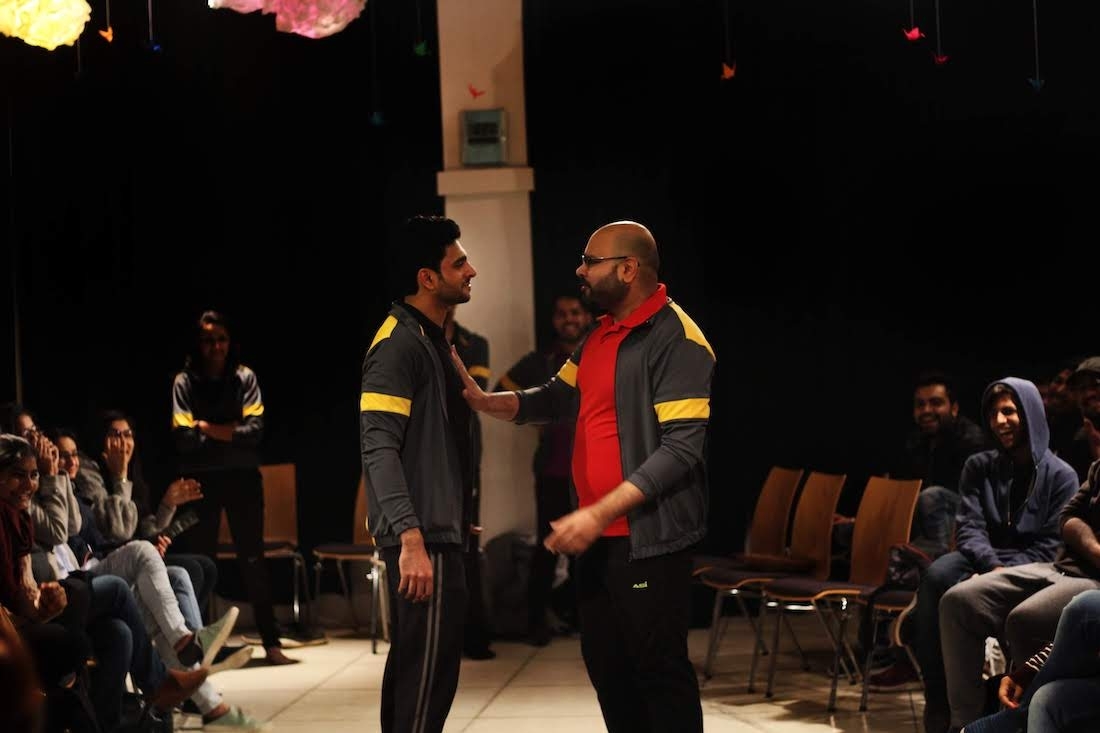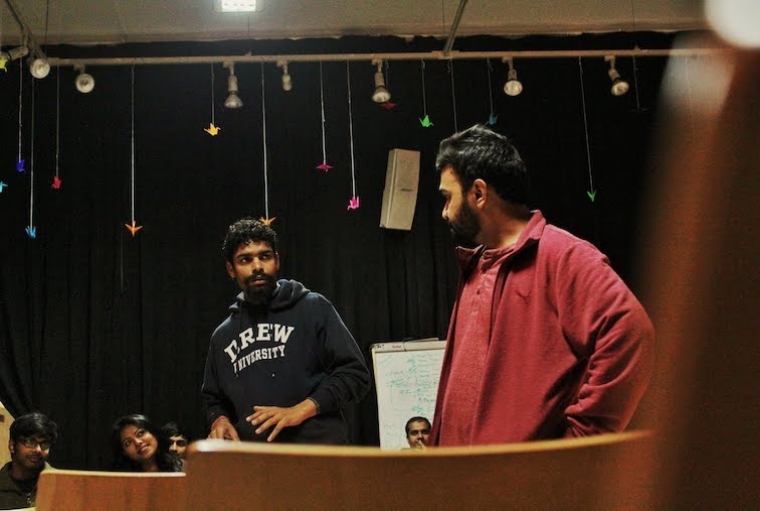

Improv theatrist Varoon P. Anand’s latest production, Unravel is an interactive act that attempts to understand issues related to mental health, and tries to find ways of coping with it. The story, created by Anand’s Kaivalya Plays, unfurls as a conversation with friends over coffee, unraveling everyday anxieties and stresses with a spoonful of humour. At the rehearsals, we witnessed a refreshing format whereby the team aims to create awareness without seeming preachy or over-bearing - what it does is create a safe space for conversation, one where judgment has no place.
The play acknowledges the complexity of mental illnesses which is evident in their “yes” and “no but” conversation, which is a mirror to the society that gives almost ridiculous suggestions such as “Have you tried Yoga” to people struggling with mental health issues. They have engaging bits that expects the audience to be a part of the production, games such as “Introduce yourself with a sound and gesture”, “3 Things” and “Move around and say hi to the person you make eye contact with”, driving the point home without stating the obvious. What makes this production unique is that as is with improv, it is an ever-evolving play, one that changes every time you witness it and one that brings diverse individuals together to share an experience unlike any other. Unravel makes you laugh, introspect, and gives you the comfort of being understood.
We spoke with Varoon about his own journey and that of Unravel.
The beginning
My journey began in 2006 in the Republic of Panama at a community theatre. The Theatre Guild of Ancón (TGA) was started by the American military when the Panama Canal was still under the control of the United States. By 2000, the Canal was returned to Panama, and by the year I came to the TGA, the theatre was pretty much dead. By 2008, an older generation of theatre makers had asked young people like me to bring forth ideas for productions. The wife of my manager at work, Danielle Miles (at the time Danielle Scott) was in Panama without any work. She’s a theatre practitioner and I roped her along to the theatre where she proposed “Improv” as a show. That group became improv8 and celebrated its 10th anniversary last year. It is one of the most successful shows in Panama and the theatre is now thriving. In India, the journey was more difficult.
The Journey of Unravel
Unravel came about after years of practice and teaching improv. I could tell that many students who gravitated towards improv were not performers. The ones who stayed were always dealing with an issue in their lives and improv is where they found acceptance and relief. So, I began investigating. In April 2018, I submitted an idea for a play called Unravel to the Goethe Institut / Max Mueller Bhavan to combine an idea centered around “provoking a discussion on mental through the techniques of spontaneous improvisation” while also applying Bertolt Brecht’s principles, especially the use of Verfremdungseffekt (translated as "defamiliarization effect", "distancing effect", or "estrangement effect", and often mistranslated as "alienation effect"). I also teach Spanish and one of my Spanish students is a medical researcher, Dr. Mansi Mathur, who began devising a medical study with me. By now the proposal had been accepted and I began devising the play by inviting Spanish students of the Instituto Cervantes with whom I had made a new team of performers.

Pictures from the Rehearsal of the Play.
In December 2018 we debuted the play as part of the Refunction programme of the Goethe Institut / Max Mueller Bhavan. The play was a resounding success and although we received a lot of acclaim, we tried to remain sensitive to the issues the audience wanted to raise to us. We don’t offer “answers” or “cures” in Unravel to anyone’s problems. We simply try to work through it together. We are not characters on stage; we are a group of friends discussing our own personal stories. The nature of improv makes every show different on every night. Because it involves audience participation, it is a completely unique experience every time.
Unravel is a unique project. Depression, manic-depression and anxiety have practically become trending buzzwords in an alienated society. The more we stick our heads into our phones, the less empathetic we seem. The more we use social media for our relationships, the more disconnected we become. Unravel is a response to the easy answers, the fashionable approach to treating serious issues, and bringing back a sense of exploration, curiosity, acceptance and openness to mental health.
Theatre as Home
It’s the one place I’ve felt at home. As the son of diplomats who lived all over the world, the stage gave me a sense of stability and freedom. Imagine a child who has to adapt his personality every three years to fit into the society he’s in. Now, imagine he has to do it from Romania to Spain, Spain to Saudi Arabia, Saudi Arabia to Pakistan, Pakistan to Panama. The stage was the one consistent place where I could find myself by inhabiting characters I had spent my whole life observing. It allowed me to be myself.
Improv is Important
Theatre on its own is rudderless. Improv was the first form of training I received. I was 28 when Improv8 began. I was best man at one of my first co-stars’ wedding in 2016. I went back to Panama in 2019 and the entire group is still in each other’s lives. Improv gave us direction when we had lost sight of how to even have fun anymore. We weren’t enjoying ourselves by going to bars or restaurants, or even trips to the beach. And all of a sudden we were in a room playing games that made us laugh and relax. From there we got on stage and started making up scenes in the moment and making each other laugh. We would leave a stressful day at work and improv would wipe away all the misery. It isn’t just about making up stuff on the spot. There were rules we had to practice, an understanding we had to come to. Improv is never done alone; it’s not stand-up comedy. And you learn quickly that being good at improv means looking out for your co-actor. “Make your partner look good,” is what our teacher always used to say. This builds a sense of responsibility. For someone dealing with depression, being able to take care of someone else for just a few minutes on a stage becomes incredibly empowering. You can’t deny anything your partner suggests or offers in a scene. Therefore, you are saying “Yes” to your partner “And” suggesting something more. The positive nature leads to the creation of possibilities.
To struggle is to win
Building on the last point, I am, by far, not the first person to notice this interrelationship and inter reliance of improv and people with mental health issues. The positive nature of our work, the responsibility we take for each other are just some of the first blatant steps that make us see it. But you become aware of more subtle differences that improv makes to mental wellbeing. For example, an improvised scene can have a lot of small “failures”, i.e. many things can go “wrong”. But we are taught never to take the perspective that we have done something wrong, but to keep building. What you notice is that the audience loves seeing the actor try. When he fails, the audience always expresses sympathy and support. This is no different than any movie or TV show. We root for the character going after what he / she wants, we need there to be obstacles to him / her getting it, and even if they fail we love them for trying. In improv, when you start taking risks in scenes and you come up against resistance, you learn not to give up but to try and fail if need be, because we’re most interested in your struggle. Ideas like this were the ones I wanted to explore further when I started getting Unravel on the floor.
Everyone can be a performer!
Mental health is an evolving issue. The first thing we are going to try to do is get a grant to both take Unravel all over the country and also develop a workshop of improv dedicated purely to mental health issues. We want to ideally offer a three-day workshop over a weekend where participants themselves become performers on the Sunday of the show.
Text Samiksha Chaudhary